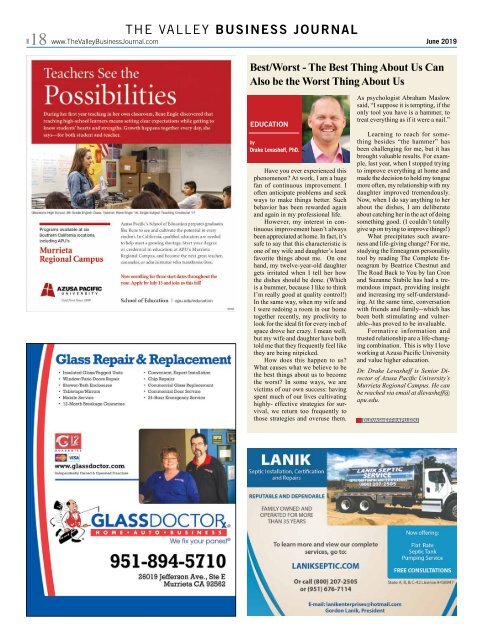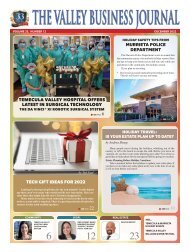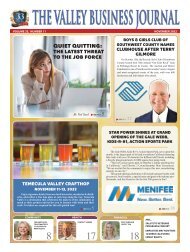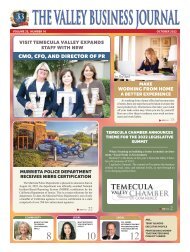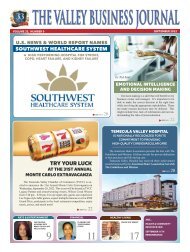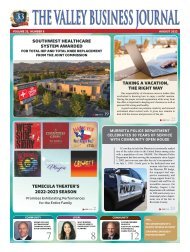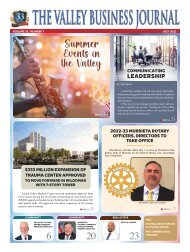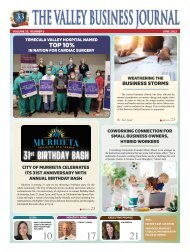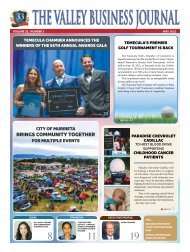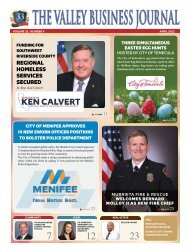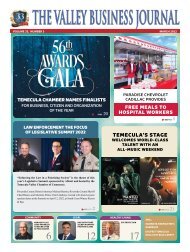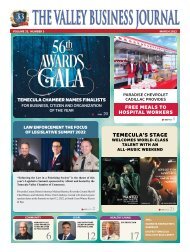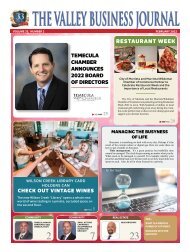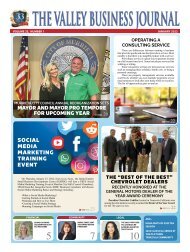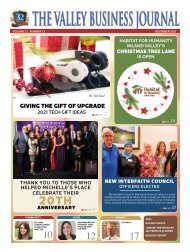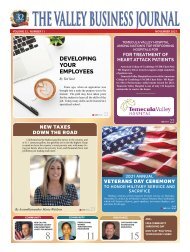VBJ June 2019
You also want an ePaper? Increase the reach of your titles
YUMPU automatically turns print PDFs into web optimized ePapers that Google loves.
THE VALLEY BUSINESS JOURNAL<br />
18 www.TheValleyBusinessJournal.com<br />
<strong>June</strong> <strong>2019</strong><br />
Best/Worst - The Best Thing About Us Can<br />
Also be the Worst Thing About Us<br />
EDUCATION<br />
by<br />
by<br />
Drake Levasheff, PhD.<br />
Steve Fillingim<br />
Have you ever experienced this<br />
phenomenon? At work, I am a huge<br />
fan of continuous improvement. I<br />
often anticipate problems and seek<br />
ways to make things better. Such<br />
behavior has been rewarded again<br />
and again in my professional life.<br />
However, my interest in continuous<br />
improvement hasn’t always<br />
been appreciated at home. In fact, it’s<br />
safe to say that this characteristic is<br />
one of my wife and daughter’s least<br />
favorite things about me. On one<br />
hand, my twelve-year-old daughter<br />
gets irritated when I tell her how<br />
the dishes should be done. (Which<br />
is a bummer, because I like to think<br />
I’m really good at quality control!)<br />
In the same way, when my wife and<br />
I were redoing a room in our home<br />
together recently, my proclivity to<br />
look for the ideal fit for every inch of<br />
space drove her crazy. I mean well,<br />
but my wife and daughter have both<br />
told me that they frequently feel like<br />
they are being nitpicked.<br />
How does this happen to us?<br />
What causes what we believe to be<br />
the best things about us to become<br />
the worst? In some ways, we are<br />
victims of our own success: having<br />
spent much of our lives cultivating<br />
highly- effective strategies for survival,<br />
we return too frequently to<br />
those strategies and overuse them.<br />
As psychologist Abraham Maslow<br />
said, “I suppose it is tempting, if the<br />
only tool you have is a hammer, to<br />
treat everything as if it were a nail.”<br />
Learning to reach for something<br />
besides “the hammer” has<br />
been challenging for me, but it has<br />
brought valuable results. For example,<br />
last year, when I stopped trying<br />
to improve everything at home and<br />
made the decision to hold my tongue<br />
more often, my relationship with my<br />
daughter improved tremendously.<br />
Now, when I do say anything to her<br />
about the dishes, I am deliberate<br />
about catching her in the act of doing<br />
something good. (I couldn’t totally<br />
give up on trying to improve things!)<br />
What precipitates such awareness<br />
and life-giving change? For me,<br />
studying the Enneagram personality<br />
tool by reading The Complete Enneagram<br />
by Beatrice Chestnut and<br />
The Road Back to You by Ian Cron<br />
and Suzanne Stabile has had a tremendous<br />
impact, providing insight<br />
and increasing my self-understanding.<br />
At the same time, conversation<br />
with friends and family--which has<br />
been both stimulating and vulnerable--has<br />
proved to be invaluable.<br />
Formative information and<br />
trusted relationship are a life-changing<br />
combination. This is why I love<br />
working at Azusa Pacific University<br />
and value higher education.<br />
Dr. Drake Levasheff is Senior Director<br />
of Azusa Pacific University’s<br />
Murrieta Regional Campus. He can<br />
be reached via email at dlevasheff@<br />
apu.edu.<br />
dlevasheff@apu.edu


